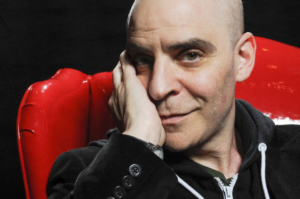After the essayist David Rakoff passed away at the beginning of August, the radio show This American Life, compiled an episode-as-elegy called “Our Friend David,” which brought together many of the stories Rakoff, who was a frequent contributor, had read on air over the years. In his introduction, host Ira Glass explained, “He was on the program so often that in putting together this week’s show, we realized we could tell a lot of his life story, simply through things he said on the show.”
This, along with the latest spurt of writing on Christopher Hitchens that has accompanied the release of his new book, Mortality, got me thinking about how those who live in the media can be eulogized in the media so well. Hitchens and Rakoff had already written the story of their own deaths, and their friends and colleagues are also in the business of writing and speaking to the public. Last December, nearly every writer and editor at Slate along with countless other figures across the vast media world wrote their own personal recollections of Hitchens. And in the weeks after Rakoff’s death, episodes of This American Life, the CBC show Wire Tap, and Fresh Air were all dedicated to him and his distinctive voice.
Slate recently published an excerpt from the final chapter of Mortality that includes the disconnected notes Hitchens scrawled in his hospital bed in his final days of life. Alongside Hitchens’ painfully lucid attempts to come to grips with his eminent demise (“Will I outlive my Amex? My driver’s license? People say — I’m in town on Friday: will you be around? WHAT A QUESTION!”) are annotations from Slate Editor David Plotz. They are the comments of a friend and a fan, still clearly grappling with the fact that even someone like Christopher Hitchens can die:
“Many of us made a point of admiring how vigorously and passionately he wrote about his illness. The unspoken message of all this almost seemed to be: Isn’t it wonderful that Hitchens is dying so brilliantly! But now that he’s been dead almost a year—a year without a column, a review, a fight—the fact that he went out so boisterously is small solace.”
In an interview last year about his novel A Sense of an Ending, Julian Barnes spoke of the desire to shape life into a story that makes sense, saying “We want our human life on this planet to be turned into a narrative . . . I think there are lots of instances where there is no narrative, or the narrative is one we don’t want to accept.”
David Rakoff and Christopher Hitchens, as well as Tony Judt in the pieces he wrote while dying from ALS for the New York Review of Books, straddled this problem of narrative, shaping the story of their own death and through that process making their way towards acceptance of the incomprehensibility of actually dying. Even when accepted, actually dying does not become comprehensible.
Each one of these men struggled to keep their words flowing in their final days. Judt dictated his pieces to an assistant long after he had lost the use of any of his limbs and until he finally could no longer speak, Rakoff finished a novel in the months leading up to his death and, speaking softly with limited lung capacity, recorded the audio book version in the studios of This American Life because he wanted to do it himself. Hitchens’ final notes are clear indication that he was never ready to put down his pen.
So what is the point I am trying to make with all this? Maybe what strikes me most is that reading these men writing about their death does not make anything about death feel easier to understand. As a means of ending this ramble on the biggest conundrum of all humanity, I’ll veer further towards the absurd.
I leave you with a line from a piece that aired several years ago on Wire Tap. It is a radio play in epistolary form, in which Gregor Samsa (of “Metamorphosis” fame) seeks advice from Dr. Seuss, as read by Rakoff. Realizing that Gregor has decided the only solution to his troubles is suicide, Dr. Seuss writes one final letter:
“I’m astonished at times when I think of the past, of my thousands of rhymes, of how life is so vast. I’m left then to wonder how anyone gleans a purpose or sense of what anything means. It is not ours for the knowing, it’s meaning abstruse.
We both best be going,
Your loving friend,
Seuss”
This post may contain affiliate links.









